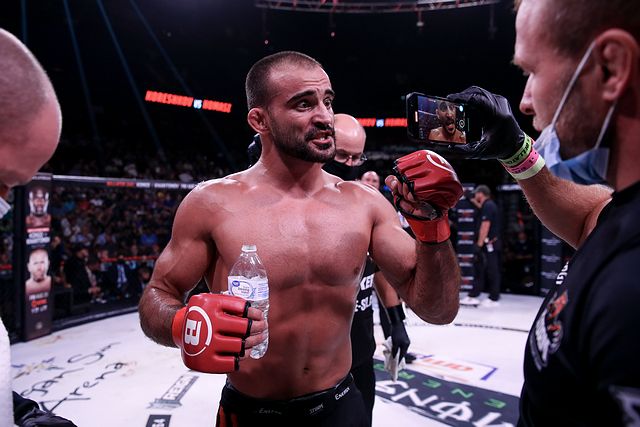The Permanent Scars of Mirsad Bektic
A Great Escape

Mirsad Bektic owns a perfect 10-0 record. | Photo: Gleidson
Venga/Sherdog.com
Mirsad Bektic walked softly through the garden of pointed white markers that dotted the rolling lush emerald hills of Srebrenica, a small mountain town in Bosnia. Every few steps he would stop, squat down and paw at the engraved inscriptions, a pang of emotion pulling at his gut. Peering through squinty eyes, he saw the names of husbands, fathers, brothers, sons and children. Some markers even had his surname on them -- a grim touchstone of his own possible plight.
The rising Ultimate Fighting Championship featherweight star was 18 when he last visited his home country. He felt compelled to see the Potočari genocide memorial, a converted cemetery which serves as a small sample size of Auschwitz, Treblinka or Dachau, since the very ground he was treading was once a mass grave and a poignant reminder of a time, a place and an atrocity the world once ignored.
Advertisement
“I know how fortunate I am,” said Mirsad, the sharp-looking 24-year-old with the 10-0 record and the first Bosnian to compete in the UFC. “I think it’s why I fight the way I do, because it could have been me; my name is on a number of those stones in that cemetery. I could have very easily been under one of those markers. I was a baby when my mother took me and my brothers out. I know people there are still bitter over what went on. I can be angry, really angry, over what happened, but I’m not. I do my fighting in the cage. When I left for Italy, and when me and my family were in Germany, I used to have really bad nightmares and flip out thinking I was dying. I would be afraid to move or make any noise. You live through war, no matter what age you are, it stays with you. I wouldn’t make any noise, because I was afraid someone would shoot me. I always felt like I was going to die.”
It was as if he took Bosnia with him, like he was a soldier dodging
bullets.
Between April 6, 1992 and December 14, 1995, a war raged in Southeastern Europe after the break-up of Yugoslavia in 1990. On one side, initially, were the Bosnian Serbs and Croats, within Bosnia and Herzegovina, and on the other the Republic of Bosnia and Herzegovina (Bosnians, who were also Muslim). Estimates say roughly a combined 100,000 people were killed, the majority of whom were Bosnians. Over 2.2 million people were displaced, mostly women and children, making it the most devastating conflict in Europe since World War II.
In the middle of this maelstrom was Bektic, the youngest of three boys, whose father fought in the war and whose maternal grandparents were gunned down by snipers on the streets. Bektic lost aunts, uncles and cousins, too, family members that he never knew -- because of the Bosnian War. There was also a brief period when he thought his father had been killed in the conflict.
How Bektic survived is something of a miracle.
***
Suada’s motherly instincts did not have to be nudged by whispers. Distress came out in thudding artillery shells that rattled the towns and buildings around her. She had to get out of Srebrenica. She was not about to let her three boys risk getting killed in cold blood like her parents. So at around the age of 1, Mirsad was scooped up by his mother and his family, as they tried to escape the surrounding war and murder.
Mirsad does not remember much, though he does recall the mode of transportation through stories he was told. They had emptied the Bosnian women and children in large dump trucks and hauled them off to the few countries that were willing to accept the thousands of refugees pouring out daily.
"These are the most classic cases of genuine refugees that you will ever see," said Jose Maria Mendiluce, who was chief of the United Nations refugee program in the former Yugoslavia at the time. "They are people who have suffered horrendously. It is very disappointing that the international community has not been able to open more doors for them."
“You feel like no one wants you, like you’re an outcast,” said Mirsad, who was inspired to pursue MMA after watching the Georges St. Pierre-Jon Fitch fight at UFC 87 in 2008. “All the men were staying there, committed to the movement: my father, my uncles. The soldiers were men and boys from every town.”
Damir Krdzic, Mirsad’s cousin, knows what everyday life was like in the war zone. They were routinely shot at. They sought solace in cornfields, where they slept.
“Things would calm down and we would return to the house to see if everything was still there,” said Krdzic, 33, who came to the United State in 1999 after living in Germany for six years and spending two years in Africa before that. “As far as being shot at, they didn’t care. I remember when we were 10, when I was playing with my twin brother and our friend, snipers shot at us. There were checkpoints, and one time we were almost executed. The Serbians wanted to take out all of the Muslims. This was not a war. This was soldiers killing innocent people, shooting them in the head. The ethnic cleansing involved wiping out all Muslims, like the Germans tried to do to the Jews during World War II.
“If you were a child, or a woman, you had to escape or you were going to get killed,” he added. “You try to replay the memories but you can’t. I remember Mirsad’s dad went away, and they didn’t know what was going on with him for a long time. It was exactly like World War II, when families were scattered all through Europe. Bosnian families were scrambled all through Italy, Africa and Germany -- whatever countries were willing to accept us. People would randomly shoot people down, women, children, they didn’t care. Mirsad got out. He lives in the United States, but Bosnia considers him their hero. It’s such a small country [that] anything good they love. All my family members know Mirsad. My country, what’s left of it, loves him. It is miracle that anyone got out. If you tried to flee, they would execute you.”
Then Krdzic relayed a story about when he and his family tried to escape. His mother, his brother and himself were pulled off a bus at a checkpoint. They were trying to get to Bulgaria to fly out, because there was no way they would have been able to get a plane out of Bosnia.
“They pulled us off the bus and looked at our passports, which said what we were,” Krdzic said. “They saw that we were Muslim, and my mother tried playing dumb. She knew what was going to happen. The guard grabbed me and my brother by the collar, pointed his rifle to our heads and said to my mother, ‘Do you want me to kill them here or do you want to come outside?’ We started crying and my mother started crying. The soldier says to my mom, ‘You know tonight, you guys were bad.’ The soldier got this call on his walkie-talkie and told the bus driver not to go anywhere. He goes in the back of this house, where you hear the gunshots from people being executed. I thought this was it. Then another Serbian soldier quickly grabbed us and told us to get on the bus and get going; he was going to deal with the other soldier. He saved our lives. It’s why I’m not going to blame all Serbians.”
Finish Reading » Come fight night, Mirsad brings himself back ... back to the congested camps in Italy and Germany, where he would wake up screaming in the middle of the night. He believes nothing can stop him if the horrors he has already endured could not.
Related Articles







